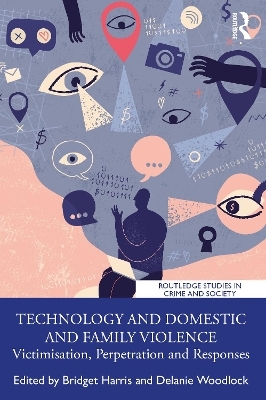
Technology and Domestic and Family Violence
Routledge (Verlag)
978-0-367-52143-1 (ISBN)
Domestic and family violence (DFV) is widely recognised as an important social issue, impacting the safety and wellbeing of victim/survivors and their children, and on a broader scale, threatening risk and security on global levels. This book provides insights drawn from research and practice in the Global South and Global North to provide an evidence base and real-world solutions and initiatives to understand, address and ultimately prevent technology-facilitated domestic and family violence and how technology can be used to effect positive change and empower victim/survivors and communities.
Technology and Domestic and Family Violence will be of great interest to students and scholars on victimology, criminology, social work, law, women’s studies, sociology and media studies. It will also be a valuable reference for practitioners, government and non-government advocates working on issues around domestic violence.
Bridget Harris is an Associate Professor/Reader of Criminology and Deputy Director of the Monash Gender and Family Violence Prevention Centre at Monash University (Victoria, Australia) and an Australian Research Council DECRA Fellow. Bridget conducts research on domestic and family violence, violence against women, the use of technology to enact and respond to harm, digital coercive control, and violence against women in rural areas. Delanie Woodlock has been working in domestic violence and sexual assault for over 15 years, providing support to victim-survivors, as well as conducting internationally recognised research in both the community and academia. She is a research fellow at Monash University in the Australian Centre for Justice Innovation. Her research has focused on violence against women with disabilities, the impact of abuse on women’s trauma, the use of technology in domestic violence, child sexual abuse material and violence against women in rural and regional Australia.
PART 1: Conceptualising, categorising, and measuring harm
1. Weaponising technology in intimate relationships: An introduction and overview
Bridget Harris and Delanie Woodlock
2. Characteristics of technology- facilitated domestic violence
Jordana N. Navarro and Shelly Clevenger
3. Technology- facilitated abuse: The need for Indigenous-led research and response
Bronwyn Carlson and Madi Day
4. Best- practice principles for measurement of technology-facilitated coercive control
Molly Dragiewicz
PART 2 Specific technologies and forms of harm
5. Cyberstalking in the context of intimate relationships:Who’s monitoring the monitors?
Brianna O’Shea, Jeremy Prichard, and Helen Cockburn
6. Technology- facilitated abuse and the internet of things (IoT): The implication of the smart, internet- connected devices on domestic violence and abuse
Leonie Maria Tanczer
7. The new Panopticon: Women’s experiences of mobile phone- mediated coercive control within abusive relationships
Tirion Havard and Michelle Lefevre
PART 3 Victimisation of cohorts and communities
8. Digital abuse of women with disabilities
Delanie Woodlock and Bridget Harris
9. The co- option of children in relation to intimate partner violence and the use of technology
Heather Douglas
10. Technology- facilitated domestic violence: Some queer considerations
Bianca Fileborn and Matthew Ball
11. Remote-control: Regional, rural, and remote women’s experiences of digital coercive control
Bridget Harris and Delanie Woodlock
PART 4 Harnessing technology
12. Domestic violence disclosure schemes: The opportunities and limits of technology and information sharing
Sandra Walklate and Kate Fitz- Gibbon
13. Technological resources for people experiencing and using violence in their intimate relationships: Moving beyond safety and referral
Laura Tarzia and Kelsey Hegarty
14. How Women of Uganda Network (WOUGNET) uses technology to respond to online gender- based violence
Sandra Aceng
15. Emergent best practices in trauma-informed design from Chayn’s interventions with and for survivors of technology abuse
Hera Hussain
16. Spaceless violence: Concluding thoughts and
future steps
Bridget Harris and Delanie Woodlock
| Erscheinungsdatum | 12.01.2023 |
|---|---|
| Reihe/Serie | Routledge Studies in Crime and Society |
| Zusatzinfo | 3 Tables, black and white; 1 Line drawings, black and white; 2 Halftones, black and white; 3 Illustrations, black and white |
| Verlagsort | London |
| Sprache | englisch |
| Maße | 156 x 234 mm |
| Gewicht | 430 g |
| Themenwelt | Recht / Steuern ► Strafrecht ► Kriminologie |
| Sozialwissenschaften ► Politik / Verwaltung ► Politische Theorie | |
| Sozialwissenschaften ► Soziologie ► Gender Studies | |
| ISBN-10 | 0-367-52143-1 / 0367521431 |
| ISBN-13 | 978-0-367-52143-1 / 9780367521431 |
| Zustand | Neuware |
| Haben Sie eine Frage zum Produkt? |
aus dem Bereich


